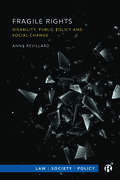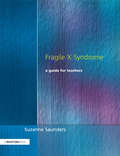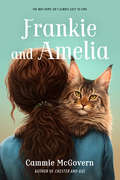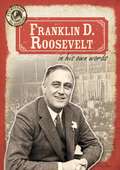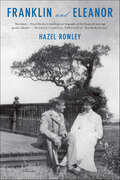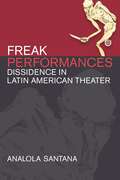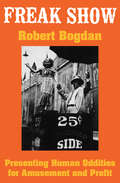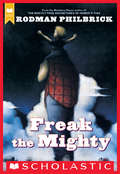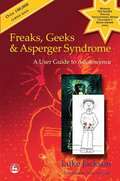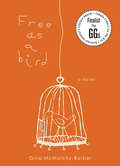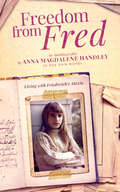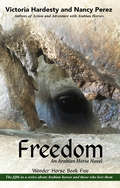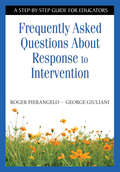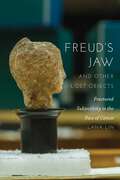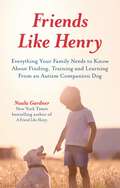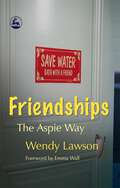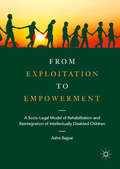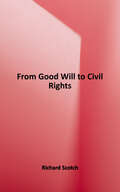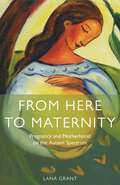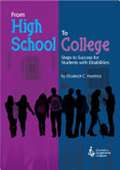- Table View
- List View
Fragile Innocence
by James Reston Jr.When the author's daughter suffers brain damage from a high fever, he and his wife go on a quest to find the cause and hopefully a cure.
Fragile Rights: Disability, Public Policy, and Social Change
by Anne RevillardThe French version of this book was the winner of the 2022 Grand Prix de la Protection Sociale. Over the years many disability-related rights have been legally recognized, but how has this changed the everyday lives of people with disabilities? Drawing on biographical interviews collected from individuals with mobility or visual impairments in France, this book analyses the reception of disability policies in the fields of education, employment, social rights and accessibility. It examines to what extent these policies contribute to the realization of associated rights among disabled people. The book demonstrates that the rights associated with disability suffer from major implementation flaws, while shedding light on the very active role of disabled citizens in the realization of their rights.
Fragile X Syndrome: A Guide for Teachers
by Suzanne SaundersFragile X Syndrome is thought to be the most common inherited cause of learning difficulties. However many people have never heard of it and those who have, including many of the professionals who work with those affected by it, have little knowledge or understanding of the condition. This book brings up to date research with information and advice from teachers who are discovering, first hand, the best ways of educating children with Fragile X. It is much needed support and advice that will help teachers to understand the child with Fragile X and encourage maximum educational progress. / While the book is aimed at teachers, it is also an excellent resource for parents, therapists and any professional working with a child who has Fragile X.
Franka: A Guide Dog
by Walter JohnsonWhen the Allen family discovered they would be going to South America for a year, they had to make a hard decision. What would they do with Franka their beautiful German Shepherd dog. The two kids Joe and Joan write the Seeing Eye and Franka is accepted into the program. Dan, Franka's trainer, is very impressed with the intelligence of Franka. When Jane Wilson arrives at the Seeing Eye for training, Dan knows Franka is the dog for her. Jane and Franka train and graduate andjane goes on to be a lecturer on guide dogs and other topics. Good historical perspective of the Seeing Eye, and the training at the school at the time. Good children's book, but good for all ages.
Frankie and Amelia
by Cammie McGovernA heartfelt companion novel to the critically acclaimed Chester and Gus about inclusivity, autism, friendship, and family, perfect for fans of Sara Pennypacker and Kate DiCamillo. <p><p> After being separated from his family, Franklin becomes an independent cat, until he meets a goofy dog named Chester. Chester is a service dog to his person, a boy named Gus, and Chester knows just the girl to be Franklin’s person—Gus’s classmate, Amelia. Amelia loves cats, but has a harder time with people. Franklin understands her, though, and sees how much they have in common. When Amelia gets into some trouble at school, Franklin wants to help the girl who’s done so much to help him. He’s not sure how, yet, but he’s determined to try. <p><p> This sweet and moving novel demonstrates how powerful the bond between pets and people can be, while thoughtfully depicting a neurodivergent tween’s experience.
Frankincense and Murder (Duncan Maclain Mystery #12)
by Baynard KendrickCyanide in sleeping pills, a C.P.A. in debt, and many suspects at one party: the Captain, Duncan MacLain, is on the case. Can he sniff out an answer before this fragrant mystery kills again?
Franklin D. Roosevelt in His Own Words
by John SheaFranklin D. Roosevelt was one of the most powerful and popular US presidents. He was the only one to serve 12 years and was elected four times. As the leader of the nation, he saw the country through an economic depression and World War II. Through primary sources, personal and political writings, and quotations, readers will become familiar with the man behind the famous name, from his early life to his momentous presidency. This book is a unique way to examine US history in the early twentieth century through the biography of one remarkable man.
Franklin and Eleanor: An Extraordinary Marriage
by Hazel Rowley“Revelatory. . . . [This] crackling new biography of the Roosevelt marriage speaks volumes.” —Maureen Corrigan, NPR’s Fresh Air, Best Books of 2010Franklin Delano and Eleanor Roosevelt’s marriage is one of the most celebrated and scrutinized partnerships in presidential history. It raised eyebrows in their lifetimes and has only become more controversial since their deaths. From FDR’s lifelong romance with Lucy Mercer to Eleanor’s purported lesbianism—and many scandals in between—the American public has never tired of speculating about the ties that bound these two headstrong individuals. Some claim that Eleanor sacrificed her personal happiness to accommodate FDR’s needs; others claim that the marriage was nothing more than a gracious façade for political convenience. No one has told the full story until now.In this groundbreaking new account of the marriage, Hazel Rowley describes the remarkable courage and lack of convention—private and public—that kept FDR and Eleanor together. She reveals a partnership that was both supportive and daring. Franklin, especially, knew what he owed to Eleanor, who was not so much behind the scenes as heavily engaged in them. Their relationship was the product of FDR and Eleanor’s conscious efforts—a partnership that they created according to their own ambitions and needs.In this dramatic and vivid narrative, set against the great upheavals of the Depression and World War II, Rowley paints a portrait of a tender lifelong companionship, born of mutual admiration and compassion. Most of all, she depicts an extraordinary evolution—from conventional Victorian marriage to the bold and radical partnership that has made Franklin and Eleanor Roosevelt go down in history as one of the most inspiring and fascinating couples of all time.
Freak Performances: Dissidence in Latin American Theater
by Analola SantanaThe figure of the freak as perceived by the Western gaze has always been a part of the Latin American imaginary, from the letters that Columbus wrote about his encounters with dog-faced people to Shakespeare's Caliban. The freak acquires greater significance in a globalized, neoliberal world that defines the "abnormal" as one who does not conform mentally, physically, or emotionally and is unable or unwilling to follow the economic and cultural norms of the institutions in power. Freak Performances examines the continuing effects of colonialism on modern Latin American identities, with a particular focus on the way it has constructed the body of the other through performance. Theater questions the representations of these bodies, as it enables the empowerment of the silenced other; the freak as a spectacle of otherness finds in performance an opportunity for re-appropriation by artists resisting the dominant authority. Through an analysis of experimental theater, dance theater, performance art, and gallery-based installation art across eight countries, Analola Santana explores the theoretical issues shaped by the encounters and negotiations between different bodies in the current Latin American landscape.
Freak Show: Presenting Human Oddities for Amusement and Profit
by Robert BogdanThis cultural history of the travelling freak show in America chronicles the rise and fall of the industry as attitudes about disability evolved.From 1840 until 1940, hundreds of freak shows crisscrossed the United States, from the smallest towns to the largest cities, exhibiting their casts of dwarfs, giants, Siamese twins, bearded ladies, savages, snake charmers, fire eaters, and other oddities. By today&’s standards such displays would be considered cruel and exploitative—the pornography of disability. Yet for one hundred years the freak show was widely accepted as one of America&’s most popular forms of entertainment. Robert Bogdan&’s fascinating social history brings to life the world of the freak show and explores the culture that nurtured and, later, abandoned it. In uncovering this neglected chapter of show business, he describes in detail the flimflam artistry behind the shows, the promoters and the audiences, and the gradual evolution of public opinion from awe to embarrassment. Freaks were not born, Bogdan reveals; they were manufactured by the amusement world, usually with the active participation of the freaks themselves. Many of the "human curiosities" found fame and fortune, until the ascent of professional medicine transformed them from marvels into pathological specimens.
Freak the Mighty (Point Signature)
by Rodman PhilbrickFreak the Mighty joins the Scholastic Gold line, which features award-winning and beloved novels. Includes exclusive bonus content!It has been over twenty years -- and more than two million copies, eight foreign editions, and a popular Miramax feature film -- since the world was introduced to this powerful story of a unique friendship between a troubled, oversized boy and the tiny, physically challenged genius who proves that courage comes in all sizes. This simple yet timeless story explores many themes, including bullying -- an important topic in today's schools. Freak the Mighty is sure to remain fresh, dramatic, and memorable for the next twenty years and beyond!
Freaks, Geeks and Asperger Syndrome: A User Guide to Adolescence
by Luke JacksonThe author is an adolescent with Asperger's, which gives him the special insight about the subject, but he adds to this a sense of humor and a lilting writing style which makes the book compelling and particularly relevant for AS teens.
Free as a Bird
by Gina Mcmurchy-BarberShort-listed for the 2010 Governor General’s Award for Children’s Literature, the 2010 Snow Willow Award and the 2011 CLA Young Adult Book Award Born with Down syndrome, Ruby Jean Sharp comes from a time when being a developmentally disabled person could mean growing up behind locked doors and barred windows and being called names like "retard" and "moron." When Ruby Jean’s caregiver and loving grandmother dies, her mother takes her to Woodlands School in New Westminster, British Columbia, and rarely visits. As Ruby Jean herself says: "Can’t say why they called it a school – a school’s a place you go for learnin an then after you get to go home. I never learnt much bout ledders and numbers, an I sure never got to go home." It’s here in an institution that opened in 1878 and was originally called the Provincial Lunatic Asylum that Ruby Jean learns to survive isolation, boredom, and every kind of abuse. Just when she can hardly remember if she’s ever been happy, she learns a lesson about patience and perseverance from an old crow.
Freedom from Fred: Living with Friedreich's Ataxia
by Anna Magdalene HandleyOn the night of a debutante ball, events set in motion an emotive and intimate portrayal of the revelation of a life changing condition. Anna Magdalene plunges deep into a personal maelstrom that is both tender and hard-hitting as it explores the hidden recesses of social understanding of her condition, Friedreich's Ataxia. On the quest for healing, Anna embarks on brave and sometimes strange journeys of enlightenment to free herself from the bonds of her condition. In one of these adventures she stumbles on an unexpected answer that brings a true light in the most disarming way, changing her whole view of what freedom is. Simultaneously, she discovers a mutual hope to join life again and a way to live with her condition, 'Fred', while she must. (Blurb by Anna's Carers, Pierre and Lee Figueira)
Freedom: An Arabian Horse Novel
by Victoria Hardesty and Nancy PerezFreedom was abused and betrayed by every human he came in contact with as a young horse. Despite his promise to his mother to grow up and become a “good horse,” he distrusted all humans while harboring the hope he would find his “Heart Human” someday. Nathan was born with Autism. He was brilliant but lacked the skill to communicate. His parents tried many forms of therapy to help their son and couldn't find one that worked for him. He grew up isolated, passing his time on a computer learning about things he'd never be able to do. Freedom's owner donated him to a therapeutic riding center. Nathan's mother got an invitation to a fundraiser for that center and investigated equine therapy for her son. Something finally worked for Nathan. Then Nathan met Freedom and magic happened. Nathan wanted to ride the Tevis Cup Ride, the toughest 100 miles in one day ride in the world. Freedom's previous owner conditioned Freedom for that ride before she donated him. Four new friends stepped up to help join the horse with the boy and help them make their dreams come true.
Frequently Asked Questions About Response to Intervention: A Step-by-Step Guide for Educators
by Roger Pierangelo George A. GiulianiFeaturing reader-friendly language, step-by-step guidelines, and informative appendices, this guide introduces educators to the purpose, principles, benefits, and application of this tiered service delivery model.
Freud's Jaw and Other Lost Objects: Fractured Subjectivity in the Face of Cancer
by Lana LinWhat does it mean to live with life-threatening illness? How does one respond to loss? Freud’s Jaw and Other Lost Objects attempts to answer these questions and, as such, illuminates the vulnerabilities of the human body and how human beings suffer harm. In particular, it examines how cancer disrupts feelings of bodily integrity and agency. Employing psychoanalytic theory and literary analysis, Lana Lin tracks three exemplary figures, psychoanalyst Sigmund Freud, poet Audre Lorde, and literary and queer theorist Eve Kosofsky Sedgwick. Freud’s sixteen-year ordeal with a prosthetic jaw, the result of oral cancer, demonstrates the powers and failures of prosthetic objects in warding off physical and psychic fragmentation. Lorde’s life writing reveals how losing a breast to cancer is experienced as yet another attack directed toward her racially and sexually vilified body. Sedgwick’s memoir and breast cancer advice column negotiate her morbidity by disseminating a public discourse of love and pedagogy. Lin concludes with an analysis of reparative efforts at the rival Freud Museums in London and Vienna. The disassembled Freudian archive, like the subjectivities-in-dissolution upon which the book focuses, shows how the labor of integration is tethered to persistent discontinuities.Freud’s Jaw asks what are the psychic effects of surviving in proximity to one’s mortality, and it suggests that violences stemming from social, cultural, and biological environments condition the burden of such injury. Drawing on psychoanalyst Melanie Klein’s concept of “reparation,” wherein constructive forces are harnessed to repair damage to internal psychic objects, Lin proposes that the prospect of imminent destruction paradoxically incites creativity. The afflicted are obliged to devise means to reinstate, at least temporarily, their destabilized physical and psychic unity through creative, reparative projects of love and writing.
Friends like Henry: Everything your family needs to know about finding, training and learning from an autism companion dog
by Nuala GardnerA four-stage programme for parents and families looking to introduce a dog into their home for the therapeutic and practical benefits that can be brought to a child with autism, including development of communication skills and toilet training. Based on first-hand knowledge, the programme was created through the successful experience the author had bringing up two children at opposite ends of the autism spectrum.This guide is comprehensive and highly practical, with case examples, tips and advice throughout. It covers all aspects of responsible ownership and training of the dog as a companion dog, and it provides tips throughout the dog's entire life cycle. Accessible for families and professionals alike, this innovative programme can have a huge impact on the life of children with disabilities.
Friendships: The Aspie Way
by Wendy LawsonPeople with Asperger's Syndrome have difficulty with interpersonal relationships, yet are well known to be loyal and dependable friends. Wendy Lawson felt she had a knack for upsetting people and was surprised to be told that she 'did friendship rather well'. In her frank and thoughtful analysis of what makes and breaks friendships, she explores what it means to have friends or be a friend - even a friend to oneself; what happens when times are tough and friends are scarce; whether one can be a 'good friend' without effort; and what other kinds of friendships there are, whether imaginary, animal or inanimate. These ideas are accompanied by practical examples, poetry and stories. Insightful and relevant to people both on and off the autism spectrum, Friendships: The Aspie Way is a fresh approach to a universal issue in human relationships.
From Anna
by Jean LittleAnna has always been the clumsy one in the family. Somehow she can never do anything right! She bumps into tables, and she can't read the blackboard at her school. Her perfect brothers and sisters call her "Awkward Anna." When Papa announces that the family is moving from Germany to Canada, Anna's heart sinks. How can she learn English when she can't even read German? Nothing could be worse than this! But when the Soldens arrive in Canada, Anna learns that there is a reason for her clumsiness. And suddenly, wonderfully, her whole world begins to change.
From Exploitation to Empowerment: A Socio-Legal Model of Rehabilitation and Reintegration of Intellectually Disabled Children
by Asha BajpaiThis book presents the outcomes of a field action project at the Tata Institute of Social Sciences (TISS). Project Chunauti (English translation: Project Challenge) focused on a group of intellectually disabled, orphan children who were survivors of abuse, exploitation and neglect, and describes their journey toward empowerment. It offers a vision and a reproducible, adaptable model for rehabilitation that can foster the social re-integration of intellectually disabled orphans at institutions. As the implementation of laws is especially important for vulnerable groups, the book also outlines a socio-legal approach that not only impacts the children directly, but can also bring about policy level reforms.Project Chunauti was born out of the need to explore options for these children and to set standards for their care, protection, rehabilitation and social re-integration. The core objectives of the project were to provide support and services, including counseling, education, life skills and vocational skills training, as well as medical and psychiatric support to help them overcome the trauma of abuse and exploitation. Its further goal was to train the staff of state-run homes and state authorities, helping them prepare and implement care plans and rehabilitation, combat child sexual abuse and malnutrition, employ positive disciplining, and better understand disabilities. The book also draws on the Project team’s experiences of rolling out the replication process in Maharashtra. This book highlights the role of the courts, media and other stakeholders in the journey towards empowerment and justice. It is a combination of social-work methods, application and implementation of law and legal advocacy, as well as best practices for protecting children’s rights and developing rehabilitation and re-integration projects for intellectually disabled, orphaned children in India. The interventions detailed here provide a reproducible, adaptable model of intervention for children in institutional care across the country.
From Good Will to Civil Rights: Transforming Federal Disability Policy
by Richard K. ScotchDescribes how America's disabled mobilized to effect changes in public policy, not once but twice, and it suggests that the struggle is not yet over. This book surveys the effects and disappointments associated with the Americans with Disabilities Act, passed in 1990, in the context of the movement to secure full civil rights for disabled people.
From Here to Maternity: Pregnancy and Motherhood on the Autism Spectrum
by Lana GrantAlready the mother of five children, Lana Grant's late diagnosis of autism at age 38 transformed her experience of her sixth pregnancy. Based on her own experiences of the challenges and joys of pregnancy and motherhood, this witty, entertaining read provides insight into the unique challenges encountered by mothers on the spectrum and provides tips and strategies for understanding and overcoming them. From physical and emotional changes, through to changes of routine and a lack of sleep, Lana Grant explains what women on the spectrum should expect in pregnancy and motherhood, as well as preparing them for the inevitable unexpected! Her stories of learning to make allowances for her feelings and her witty anecdotes offer support and a like-minded voice to women on the spectrum. She discusses everything from learning to understand the language used by medical professionals, who to tell what and when, and the dangers of over-sharing, through to sensory challenges during and after delivery, what to expect from staff in the hospital, and the social challenges of interacting with other mums before and after the birth. The first book on this important topic of pregnancy and motherhood on the autism spectrum, From Here to Maternity provides much needed support, insight and understanding for women on the spectrum, their family and friends, and the professionals working with them during and after pregnancy.
From High School to College: Steps to Success for Students With Disabilities
by Elizabeth HambletCollege is a different world from high school and the laws, expectations, and culture around disability services and accommodations are different, too. Elizabeth Hamblet, a Columbia University Learning Specialist/Consultant and recognized transition speaker and writer, has written a one-of-a-kind, step-by-step guide that is an essential resource for college-bound students, their families, and the special educators and school counselors who work with them.

